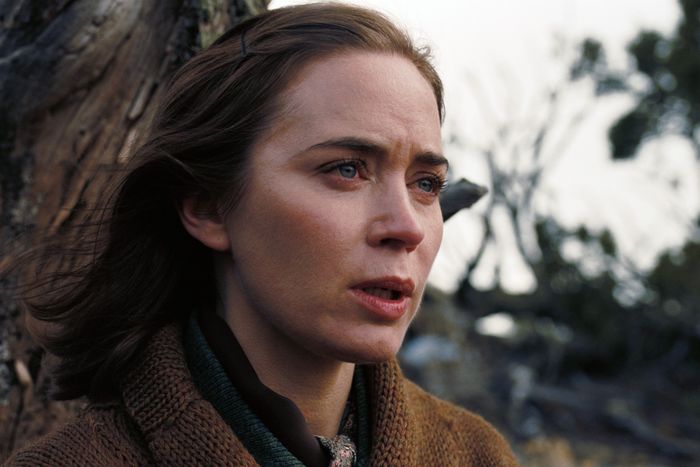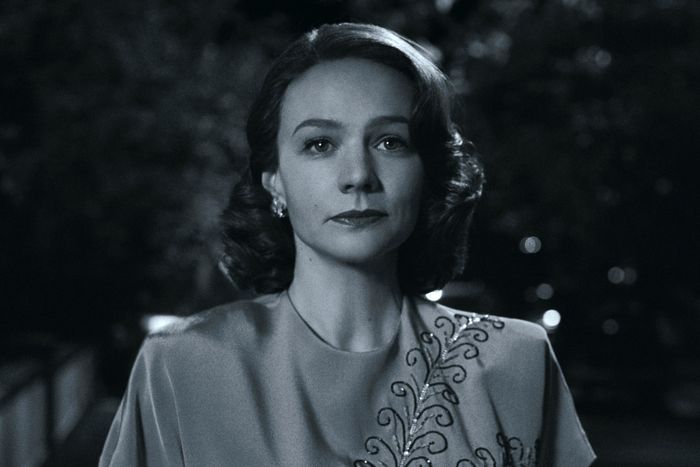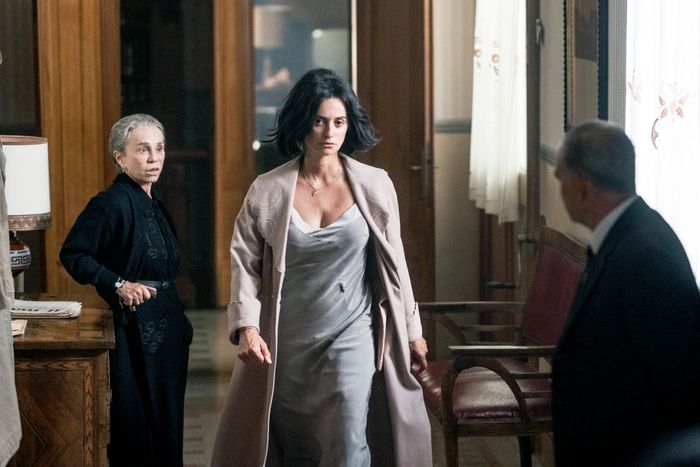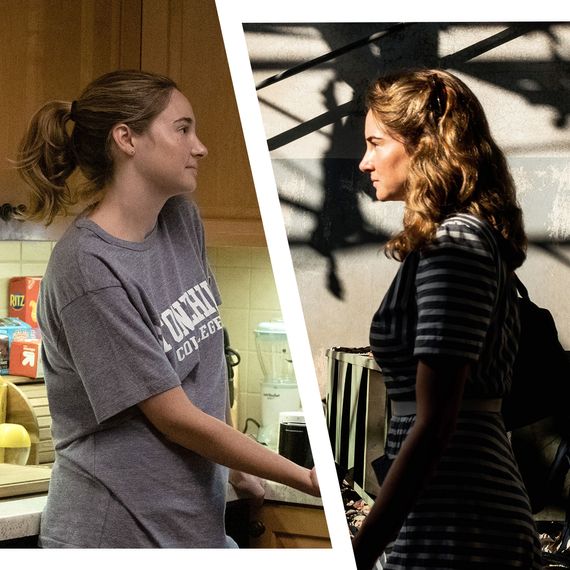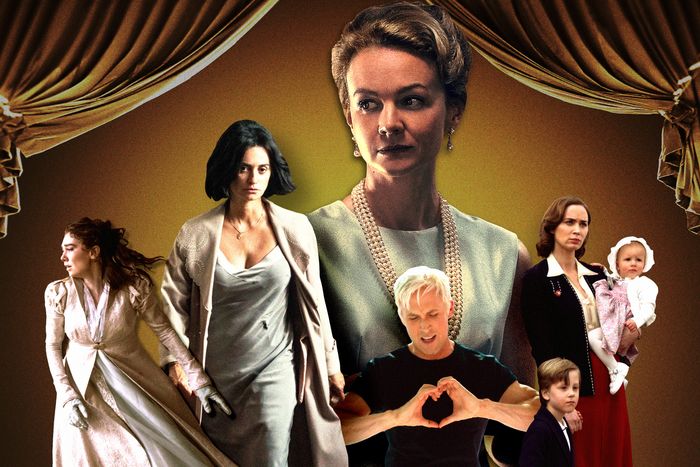
Girl meets boy. Girl marries boy. Boy cheats on, disregards, or is generally terrible to girl due to the staggering burden of his genius. Girl and boy fight. Girl chooses to stand by and emotionally support boy at an important moment in his career. Girl rededicates her entire life to boy, happily, despondently, or ambiguously ever after.
Such is the plot of many biopics from the perspective of the Wives: the female characters married to Great Men, whose entire lives bend toward their husbands whether they are happy with them or not. While the stereotypical Biopic Wife is a self-sacrificing cardboard cutout in the shape of a woman — with apologies to Alicia (Jennifer Connelly) in A Beautiful Mind — in recent years these characters have gotten more to do than simply stand by their man’s side. These women have agency now, and luckily for screenwriters, they all have the same kind: specifically, the agency to get mad at their great husbands, then ultimately forgive them. A pioneering example of this new class of Wives is Claire Foy as Janet Armstrong in 2018’s First Man, who spits out a description of her husband and his NASA peers as a “bunch of boys” with such venom that it shocked the system. Many of last year’s Wives followed in her footsteps, raging and ultimately forgiving their way through the many prestige biopics that now dominate awards season.
The Oscars are around the corner, and some of these women are being recognized in the Best Actress and Best Supporting Actress categories. But it’s important to draw a distinction between a true Biopic Wife and a character who just happens to be married to a man, such as Lily Gladstone as Mollie Burkhart in Killers of the Flower Moon or Sandra Hüller’s roles in The Zone of Interest and Anatomy of a Fall. The latter have lives and motivations of their own; the former don’t. The Wives aren’t here to reflect the expanse of the human experience; they are coloring within the lines, often to glorious effect. We here at Vulture believe it’s worth celebrating and considering these characters on their own terms — even if those terms are still always defined by the importance of their spouses.
The Girlboss Award for Biggest Slay — Emily Blunt as Kitty Oppenheimer, Oppenheimer
The “wife turn,” as the BoB Awards means it, refers to the moment when the wife in a biopic decides to stand by her husband even though they have been fighting, they hate each other, or he has been cheating on her for countless years. It’s key to restoring some of the man’s dignity heading into the final act. Nobody did that better last year than Emily Blunt’s Kitty Oppenheimer. At Oppie’s final hearing, an aggressive Jason Clark (as U.S. Attorney Roger Robb) questions Kitty about her and her husband’s alleged ties to the Communist Party. He asks loaded questions about events that took place nearly two decades prior, expecting her to fold the way her husband just has. Instead, Kitty fires off pithy defenses almost faster than Robb can muster questions, all in the most mid-Atlantic accent perhaps ever captured on film. The centerpiece of the scene is when she begins toying with Robb, referencing the beliefs she has held since she “left the party 16 years ago — 17 years ago, my mistake. Sorry, 18. Eighteen years ago.” She flusters her adversary, then finishes him off with a knowing smile. Her girlboss rays are set to stun.
When Kitty chooses to support Oppie, the audience is not let into her reasoning for the decision; instead, director Christopher Nolan maximizes the anticipation about whether she’ll support or sell out her philandering husband. The film deprives Kitty of a clear or trackable arc — how does she manage to awaken herself from an alcoholic stupor to go protect her man? No one knows. The complete lack of explanation combined with the intensity of her defense (and accent work) reaches a kind of operatic, girl-slay intensity that is unique among the Wives. Nolan has been criticized for years about his apparent inability or unwillingness to write fully realized female characters — Blunt is the first woman he has directed to a nomination. Her singular dedication to playing Kitty to her fullest extent, bottle smashing and all, is inversely proportional to how much range there is to play. The result? Endlessly entertaining chutzpah.
Best Verbal Bitch Slap — Carey Mulligan as Felicia Montealegre, Maestro
Carey Mulligan’s Felicia Montealegre (a.k.a. Miss Fag Hag 1961) is, for much of Maestro, the world’s best beard. She lets Bradley Cooper’s Leonard Bernstein munch butt and emotionally distance himself from others to his heart’s content, so long as she remains his primary confidante and emotional caretaker. Things take a turn when Lenny finds a twink (Gideon Glick) to hold his hand, give him coke and cock, and emotionally support him instead of Felicia, leading to the best (funniest) scene in the film, when Felicia and Lenny fight on Thanksgiving. At the argument’s most heated point, Mulligan spits out the words “If you’re not careful, you’re going to die a lonely old queen.” It’s the ultimate hag’s revenge, using her knowledge of gay culture to create a bitchier insult than any of the other films on this list can muster.
It wins Best Bitch Slap for the way it manages to stop Maestro in its tracks, introducing, via the simple word queen, the notion that gay culture exists. Until now, homosexuality in Maestro has played out in foot rubs, furtive glances, and a single kiss. Bernstein’s sexuality is a personality quirk, and he has found the woman who can cope with it. Then, suddenly, this is a gay man, and, in his world of musical theater, that’s a known quantity. Leonard Bernstein, for all his greatness, is reduced to nothing but a basic faggot. No moment in Maestro reaches the scathing high of “lonely old queen” because the film otherwise refuses to engage with the real world, preferring to exist in a fantasy where everybody talks at 1.5x speed.
Best Male Wife — Ryan Gosling as Ken, Barbie
In perhaps the year’s greatest biopic, Barbie, Ryan Gosling plays an impotent Ken who begins the movie entirely dedicated to his partner, Barbie (Margot Robbie), before turning against her when she ignores him and then ultimately coming back to caring about her. Sounds like a Wife! Of course, Ken’s perspective as a marginalized citizen of Barbieland is more fully considered than the vast majority of the Wives, but such is life.
Best Work in the Field of Hating Your Husband — Penélope Cruz as Laura Ferrari, Ferrari
While most of the Wives here begin their films at least liking their husbands, Penélope Cruz as Laura Ferrari doesn’t bother. Ferrari starts in medias res, with Enzo Ferrari (Adam Driver) sneaking out of the house of his mistress (Shailene Woodley) and coming home to a furious Laura. It is clear immediately that these two are not in a happy marriage. Slowly, we learn she blames him for their son Dino’s death. While the audience does get a moment of insight into happier times via flashback, their union is largely depicted as unrelenting. Even so, Laura still gets that classic “wife turn” when she helps Enzo keep his company alive through paperwork, bribery, and anti-journalist sentiment. Nevertheless, Laura’s main occupation is sulking and skulking in shadows, being mad, and throwing vegetables. It’s very impressive work.
What really clinches her award here, however, is that even when she’s helping Enzo out, Laura still manages to twist the knife. She makes her assistance contingent on Enzo’s not acknowledging his bastard son as a Ferrari until her death, in Dino’s honor. That’s hater shit on a level most Biopic Wives could never even dream of, and this is after she steals the bastard kid’s toy car! She’s an iconic Sicilian widow (Sicilianness unconfirmed) — wailing forever at the loss of her son while wearing all black. Enzo is never fully forgiven or emotionally supported, and Laura never leaves the shadows.
Best Basically Incomprehensible Dedication to a Husband — Vanessa Kirby as Empress Joséphine, Napoleon
Napoleon, Ridley Scott’s underratedly weird film about the French emperor (Joaquin Phoenix) features a lot of baffling decisions, such as Napoleon being the only person with an American accent. But nothing is stranger than Empress Joséphine’s single-minded, utterly unexplained dedication to her ex-husband at the end of the film. Early on, she betrays him by sleeping with another man, but her “wife turn” comes soon after, and by the halfway point she has rededicated herself to their marriage (with some kinky sexual power plays in between). Then Napoleon divorces her because she cannot bear a son, and by the end of the movie, she lies in bed dying, repeating that Napoleon is coming back like a parrot that happens to have tuberculosis.
In Napoleon, Joséphine is, shall we say, an enigma, initially presented as a schemer looking for stability for her family through her marriage to Napoleon, but the audience loses sight of her interiority soon after. It is entirely unclear when or why she becomes enthralled with Napoleon to the point of dedicating her final breaths to him. Scott has said the four-hour “director’s cut” of the film included a lot of Joséphine content that ended up on the cutting-room floor when he had to shorten it for theatrical release. Yet Napoleon wins this award because its supreme lack of perspective on its female lead reads as a stylistic choice. Josephine is so entirely illegible a character that it becomes impossible to look away from her. Who is this woman? Why is this woman? Napoleon has no answers.
Honorary Award for Never Being Mad at a Man at All, Actually — Shailene Woodley, Ferrari and Dumb Money
While movie Wives in 2023 were largely notable for their differing opinions on the Man in Their Lives, one woman managed to play not one but two utter doormats. Shailene Woodley, in both Ferrari and Dumb Money, is deeply understanding and supportive. Always — whether her man is married to someone else and refuses to publicly acknowledge their son as his own (as in Ferrari) or hyper-focusing his entire life on buying GameStop stock (as in Dumb Money). While this unfortunately does not qualify her for an actual BoB, her work is nonetheless seen and supported by the Academy.



